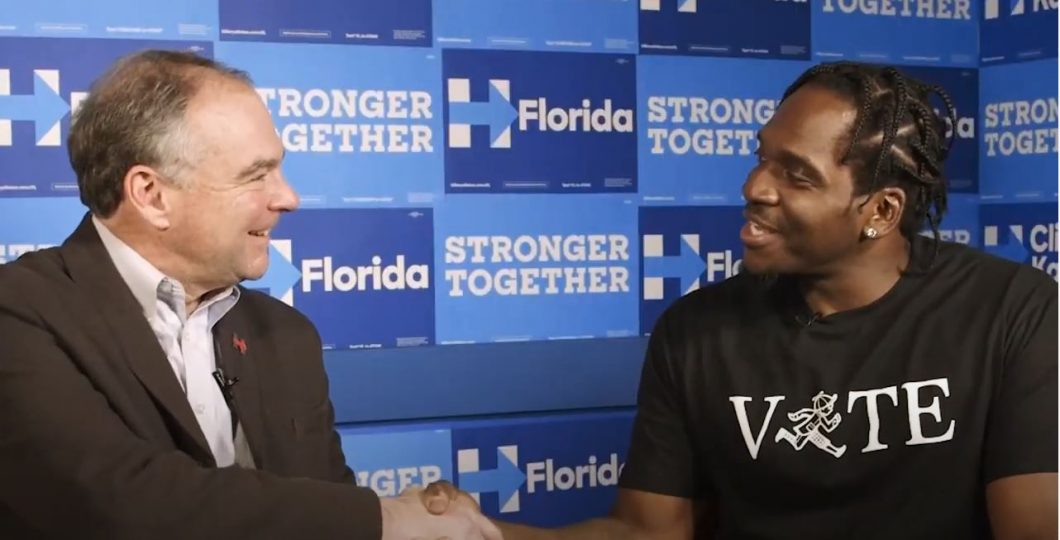A Sword That Anyone Can Use
Editor’s Note: This essay is part of a symposium on identity politics sponsored by the Ryan Foundation.
There is an image from the excruciating 2016 presidential campaign that sticks out in my memory. In the scheme of all that transpired and all we’ve come to know since then, it’s minor, a detail in a very long and complicated story whose ending has not been happy at all. Yet it is also distinctive, whether in its condescending cynicism or in its hapless naiveté; and it is emblematic of the broader context in which our nation’s politics is now relentlessly forged.
At an October rally in predominantly black Liberty City, Miami, the Democratic vice-presidential candidate, Tim Kaine, stepped onstage alongside Terrence LeVarr Thornton, better known as “Pusha T”—a performer whose stage name suggests how he has distinguished himself over the past two decades as one of the most wholeheartedly committed proponents of “cocaine rap.” The Clinton campaign’s decision to use Thornton—who so blithely embodies some of the basest stereotypes that American society attaches to young black men—as a means of pandering to black voters was as embarrassing as it was transparent and insulting. But even more remarkable that day was that Kaine didn’t even pretend to appeal to anything more than surface-level identity signifiers.
In a conversation between the two, after Thornton remarked that he never imagined a black man would be president, Kaine pivoted to the historic opportunity presented by the Clinton campaign: “Just like the election of President Obama moved us forward as a nation, because there had never been an African-American president, the election of Hillary Clinton will move us forward as a nation, because there’s never been a woman president,” he explained. This, of course, is both literally true and an extraordinarily narrow vision of what political life is and can and should be. “It is not good enough for somebody to say, ‘I’m a woman, vote for me,’” Bernie Sanders had already pointed out months earlier, during the primary contest. Yet that is precisely what Kaine insisted on doing.
“We need a post-identity liberalism, and it should draw from the past successes of pre-identity liberalism,” wrote Mark Lilla, a historian of ideas at Columbia University, in a widely discussed piece in the New York Times immediately after the Clinton loss. “Such a liberalism would concentrate on widening its base by appealing to Americans as Americans and emphasizing the issues that affect a vast majority of them.
“It would speak to the nation as a nation of citizens who are in this together and must help one another.” Democrats, he argued, had blown a winnable election in large part because “American liberalism has slipped into a kind of moral panic about racial, gender and sexual identity that has distorted liberalism’s message and prevented it from becoming a unifying force capable of governing.”
He was not the first to make the argument. Just several weeks before the election, George Packer, then at the New Yorker, recalled something that the African-American economist Glenn Loury had observed about this very dilemma:
As [Loury] sees it, if race becomes an irreducible category in politics, rather than being incorporated into universal claims of justice, it’s a weapon that can be picked up and used by anyone. “Better watch out,” he said. “I don’t know how you live by the identity-politics sword and don’t die by it.” Its logic lumps everyone—including soon-to-be-minority whites—into an interest group. One person’s nationalism intensifies tribal feelings in others, in what feels like a zero-sum game. “I really don’t know how you ask white people not to be white in the world we’re creating,” Loury said. “How are there not white interests in a world where there are these other interests?”
These unheeded observations from four years ago have only grown exponentially more pressing and relevant at the close of 2020. We sorely need, now more than ever, what Loury has referred to elsewhere as a “transcendent humanism” that would unite us around common, easily communicable values, principles and shared investment in a collective future rather than further splintering us into ever more hyper-specific and aggrieved identity groups vying against each other for slices of a shrinking national pie.
We are going to need a liberalism that . . . soberly recognizes the harsh and irreducible realities of who we are while inspiring us to see, and live, beyond them.
Identity politics succeeds in large part because, for the moment, it is telling the simpler, more compelling stories. No matter how many civics courses liberals fund, it is going to take something much more emotionally resonant than an abstract notion of common American citizenship to make an ounce of lived difference. One of the more frightening lessons of the Trump victory has to do with the implacability of tribalism. To combat it we will have to commit, within our communities and ourselves, to a novel, shared American story capable of piercing as deeply as the primal and particular identities that animate so many people and interest groups. This will necessitate that we seriously address class identity, too—the struggle against economic inequality must take notice of psychology and culture—without merely subsuming it within the reflexive and frequently obscuring language of ethnicity and race.
What we need, then, is a liberalism that neither downplays nor fetishizes identity grievances, but looks instead for ways to build on who we are more broadly, and to conceive more boldly what we might be able to accomplish in concert. Yet as the tenuousness of even our most noble and seemingly durable civil rights gains grows more apparent by the hour—as, for example, the vote in many states becomes more difficult and women’s autonomy over their own bodies more contested—we must also consider that a full healing may not be possible. The rancor in our politics may be as permanent as it is unpleasant. There will always be alienated citizens and communities. There will always be groups that value themselves most of all. There will always be political winners and losers. The commonality of which the unifiers and the healers must necessarily speak may be forever aspirational, but that does not mean that we can ever allow ourselves to merely accept the current, demeaning divisions as ineluctable, and in turn allow ourselves to stop striving.
Yet the difficult truth is that people do not readily move on from even tremendously flawed paradigms within a vacuum. And so we are going to need a liberalism that, while pushing America to equal its ideals—which are not and were never “false,” as it becomes fashionable to maintain—soberly recognizes the harsh and irreducible realities of who we are while inspiring us to see, and live, beyond them. That would mean a liberalism that is unafraid to acknowledge that boardroom diversity, racial quotas within the Ivy League and other elite spaces, coerced confessions of white fragility and privilege, and a billionaire class tailored in direct proportion to the nation’s shifting demographics will continue to leave the overwhelming majority of Americans—and in no small measure America’s ethnic minorities—grossly underserved. On a policy level, the implications of this are pretty clear: any radicalism that can be so easily embraced by the Fortune 200 is not a genuine radicalism; by the same token, any politics that will win significant reforms for the minorities who stand to benefit from them the most will almost certainly need to win them for all Americans.
The argument against identity politics, therefore, must find tangible ways to model alternatives to the various labels that so many of us suspect, and know, will always serve us inadequately. I don’t have all the answers here, not even close, but of one thing I am certain: one of the great intellectual projects of the coming years and decades will be to make honest sense of our increasingly complicated national realities—to set aside the voguish, oversimplified discourse of catharsis and put forth a correct and compelling vision of a multiethnic America (and a multiethnic set of democracies around the world). It will be a vision that will have to acknowledge the inherited importance of race and other identity categories while attempting to attenuate, rather than reinforce, the extent to which these abstractions can (or should) ever contain us.



